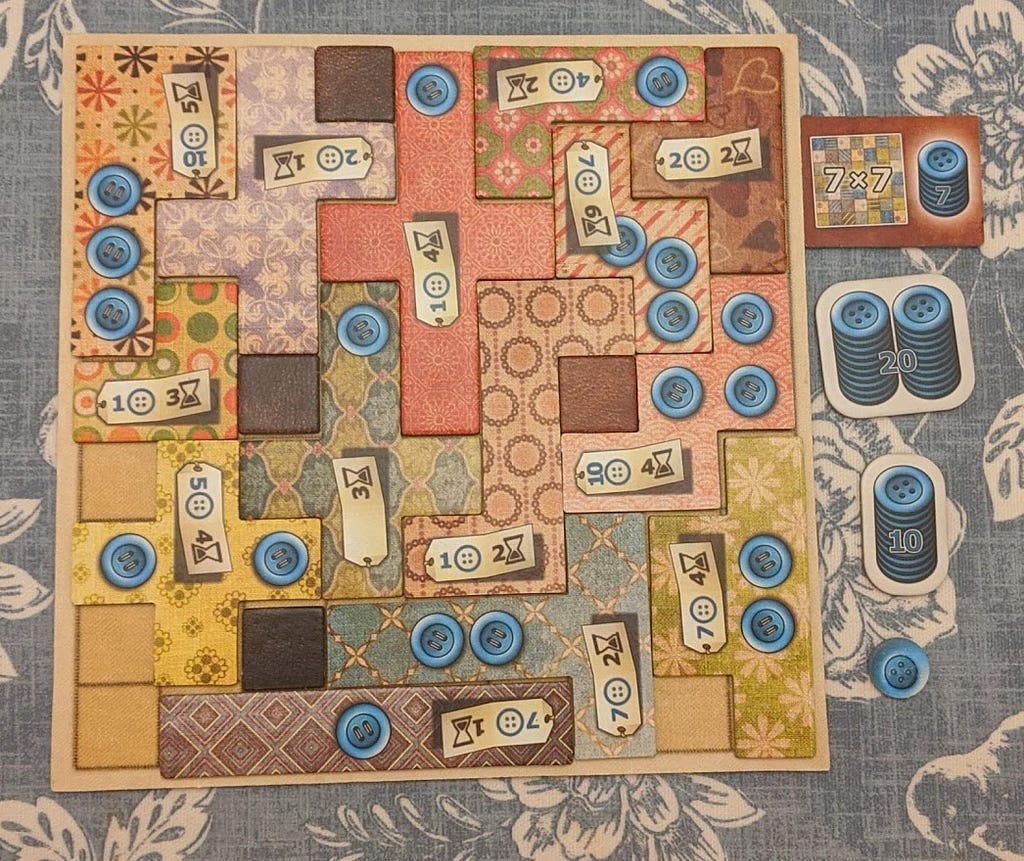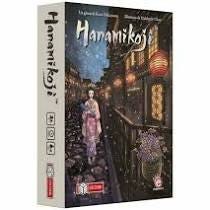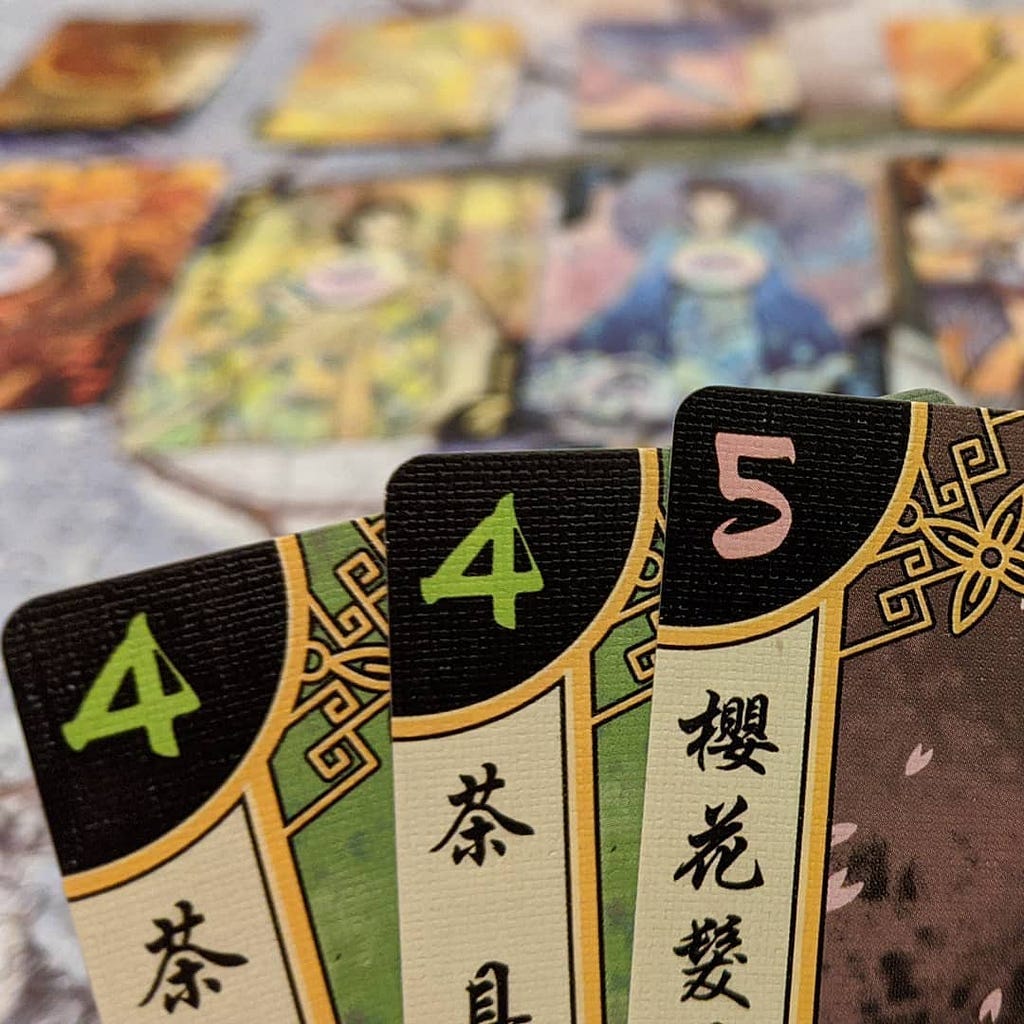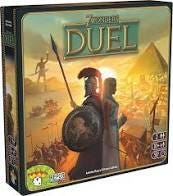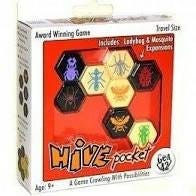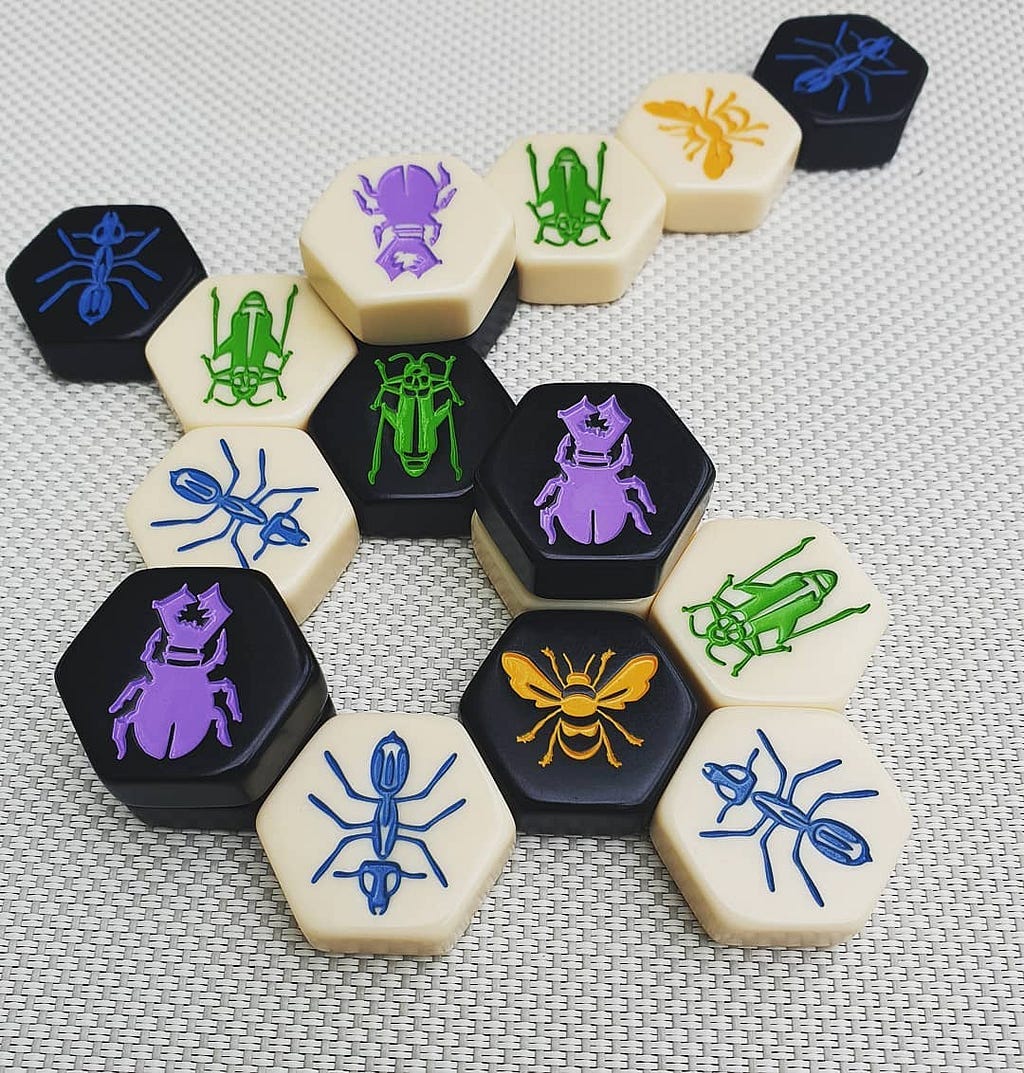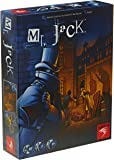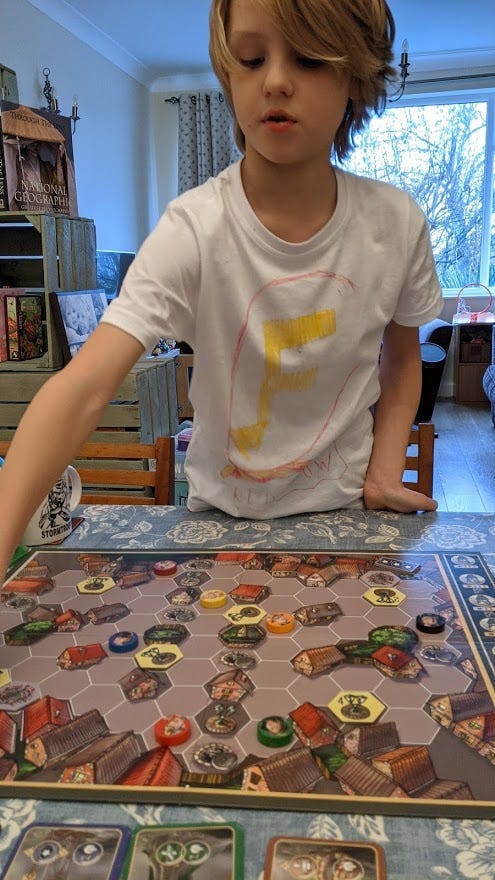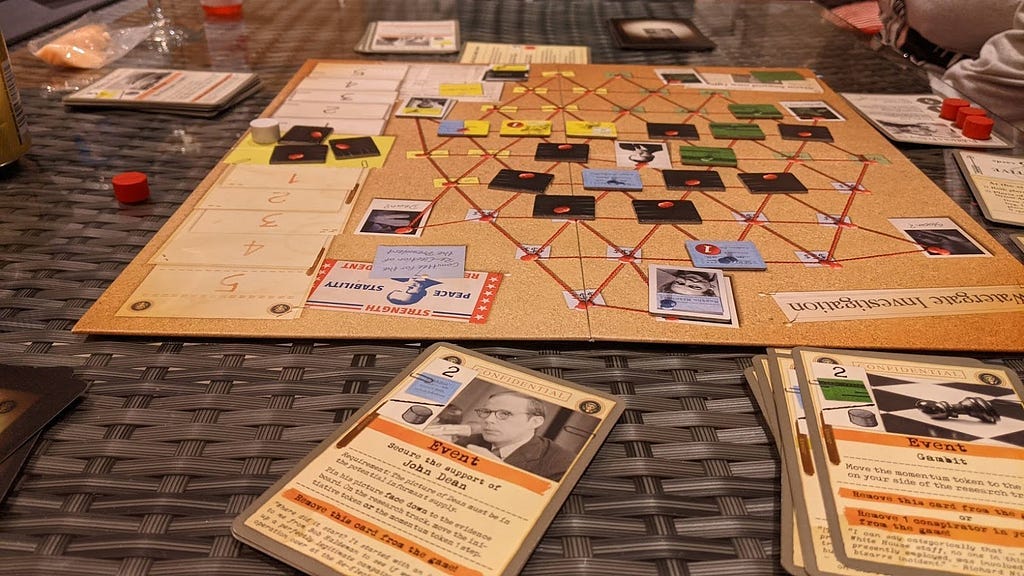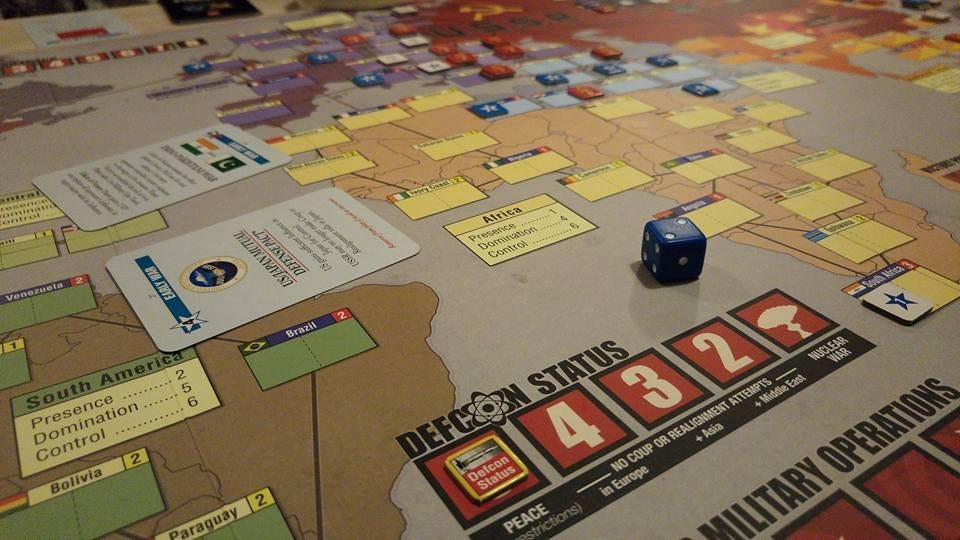Boardgame Recommendations: Perfect for Couples
This time of year I get asked a lot about board games, and so I thought I’d put together some posts on my recommendations. In this post, I’ll be walking through my top suggestions for games for couples based on what's been at our table this year. If you’re anything like us you’ll likely have spent a lot of time together this year and you’ll be looking for gifts for your significant other (or friends) to help those long winter evenings sail by.
All these games are solely for two players, and I’ve ordered them from easiest to pick up to hardest, although none are too heavyweight bar Twilight Struggle.
Jaipur: Perfect for beginners
Jaipur is a card collecting game based on trading for goods and jewels (oh and camels) that’s simple enough for my 8-year-old to play but deep enough for adults to play, with lots of depth. It keeps coming back to our table and is one of our favourites as a couple.
Each player will compete to collect sets of cards which they can trade for goods and jewels of different values, as these are “purchased” with the cards the value of the remaining goods diminishes. Thus players much balance winning the more valuable goods, early in the game, and collecting cards to earn bonuses for purchasing multiple goods/jewels at the same time — with increasing bonuses for up to 5 cards laid at once.
This game can last 15 mins as a single rubber, but played as a best out of 3 (as intended) takes around 45 minutes to an hour.
The game is fairly small and so is perfect to play while travelling.
Patchwork: Perfect for crafty couples
Patchwork, from renowned games creator Uwe Rosenberg, is a terrific game in which players take turns to collect pieces of a patchwork quilt and “sew” them into their board, collecting buttons along the way. The player with the most buttons at the end of the game will win. Each piece costs time and buttons to sew, meaning players must manage their buttons and time remaining on the time track in order to ensure they fill as much of their quilt as possible and avoid losing valuable buttons at the end. Spatial skills are tested here (much to my wife’s frustration) as finding the right pieces to fit your quilt can be a challenge.
This is a game that will often come to our table after a heavier game, helping us settle our brains and finish our drinks with something light before we finish for the evening. Highly rated in our house, and judging by how close our games have been (my wife is winning 16 v 10 this year), one that is sure to remain so. The space needed to play can be quite big, with the pieces needing to be spread out in a circle — so it’s not one for playing while travelling.
Hanimikoji: Perfect for when time is short
Hanimikoji is a game that’s quite unlike anything else we play. The game theme is centred around winning the attentions of 7 geishas but to be honest, that’s secondary to the play.
The game is super simple, with each mini-game consisting of just 4 actions each player can take. Discard two cards, keep one card, offer two pairs to your opponent, who keeps one, or offer three cards to your opponent, who keeps one, while you keep two. Once used, an action is lost for that mini-game. This simple “I cut, you choose” mechanic hides a lot of complexity, with players being pulled between giving their opponent valuable cards and losing influence on a geisha, verses gaining enough influence of their own to secure a geisha of their own.
This is another terrific game that offers lots of replayability in a small space, making it easy to travel with. It also plays in around 30 mins, making it a quick game to bring to the table.
Fungi / Morels: Perfect for nature lovers
Funghi (known as Morels in the US) is a delightful game about collecting mushrooms. Walking through the forest players must collect cards, mainly mushrooms, before cooking them in a pan for points (with butter/cider cards for extra bonuses). The tension comes from the “decay” pile where a card moves every turn, meaning players can grab everything that’s decaying instead of taking a single card. Skilful, or poor, use of fly agarics (which make players discard some cards) and baskets (which help players hold more cards) will mean players can build-up bigger sets and cook them for a lot of points. Of course, you might choose to sell less valuable mushrooms at the market and get sticks to help reach further away cards before your opponent.
This 45 min game, has a little complexity, especially with the tableau of the forest, and sliding around cards, but is very thematic and might be the perfect game for a couple who’ve played other simpler games on the list.
7 Wonders Duel: Perfect for competing couples
7 Wonders Duel, a two-player version of 7 Wonders, plays over three historical ages, seeing players competing to collect cards offering resources and victory points. With three ways to win — Military, Science or a VP victory — players are constantly battling on different fronts. Do you grab more resources, or grab gold and buy them from the other player? Do you push your opponent on the military track or gain vital VP from building one of 7 wonders (you each have four wonders meaning one won’t be built)?
Each age in the game has a different layout from which cards are chosen, introducing luck and skill in equal measure. This is a game with lots of strategic depth that’s relatively easy to learn and play. It also has a great back and forth competitively meaning it will suit those couples that just love to compete.
We’ve played this on a cruise in the bar, it needs some room, but will fit on a small table and so will work for travelling if there’s some space, but not a plane. At under an hour, the typical playtime isn’t too bad either and this remains a game we return to very regularly.
Hive Pocket: Perfect for strategic thinkers
If you’re a couple that enjoys a good chess game then Hive might be the game that helps stretch those strategic muscles while on the move. I’d recommend the “pocket” version, which plays identically to its unnecessarily large sibling.
Each player takes turns to add or move pieces in a “hive” of pieces formed by them and their opponent, attempting to surround their opponent's Queen Bee and win the game. With several pieces, all moving differently around the hexagonal hive formed by the pieces (there is no board), this is a delightfully skilful game with a lot of depth but simple enough rules to learn in one or two plays.
This isn’t a game that comes to our table regularly, it’s not a game that suits my wife’s tastes (highly strategic and very little luck) but I’d recommend it to anyone who likes to dual it out with a tactical adversary.
Mr Jack: Perfect for budding detectives
Mr Jack recently returned to our table with my 8-year-old wanting to play, so I taught him in less than 15 mins — which shows how easy this game is to learn. Don’t let that fool you though, this game has tons of depth and is just as tactical as any chess match but with some luck thrown in depending how the cards fall.
One player will play Evil, whose aim is to escape into the night, the other player will play Good, attempting to figure out which character is Jack and unmask him/her. The interesting dynamic though is that both players will move the eight characters on the board, one of whom is randomly chosen as Jack and known only to the evil player. Evil will try to move without making it obvious which character Jack is and ultimately give Jack an avenue along the alleys and off the board. Good, on the other hand, will attempt to narrow down the options by asking “is Jack in the light or dark” at the end of every turn, thus using the process of deduction to rule out who Jack might be.
Each character has unique abilities, moving manholes or lights for example, making the game a constant battle of wits as Jack attempts to bluff out the time while making their escape. We have a blast playing this, and with just a 30–40 minute play time it can see a couple of plays in an evening.
The board is around the size of a scrabble board, so not particularly suitable for travel, and the game box itself is the biggest featured in this list. Don’t be tempted by the travel version either, as I’ve heard that’s a slightly different game.
Watergate: Perfect for politics buffs or wannabe reporters
My personal favourite game on the list Watergate is a super thematic game that pits the players together as President and Reporters, attempting to hide/uncover the Watergate scandal through the events of ‘72 to ‘74.
With each player having a unique deck of cards, the reporter will attempt to connect the conspirators surrounding the scandal to the president himself on their pinboard using evidence tokens. The president will use all their powers to block evidence and close down potential links.
Each turn in the game sees player play a hand of cards, choosing to play the event (moving the card out of the game) or for points (so it comes back in play as the deck is shuffled). Using these cards players play a tug of war over evidence and influence/power markers attempting to win them for their side to help build evidence or gain the advantage in future rounds.
This tug of war, and the events, makes the game brilliantly thematic as players vie for control. Games are often won on a knife-edge that could go either way. I’d recommend for any couple that is looking for a tactical game with a solid theme.
There are two small boards to the game, making it hard to play while travelling, but the box is small enough to carry around and play at a hotel.
Twilight Struggle: Perfect for those seeking world domination
No list of two-player games would be suitable with Twilight Struggle, which for a long time featured as the best game in the world on BoardGameGeeks game rankings.
I hesitate to add this as the long play time and complexity make it very unlike every other game on this list, and while I LOVE this game my wife HATES it.
Playing competition the superpowers through the cold war players play out events using their cards (much like Watergate) for points to use as influence or for the events themselves — removing them from the game.
The play unfolds on a global map, with players scoring for their influence across certain areas and battleground states. The game has a lot of depth, with skilful mastery of the cards key to winning the game among good players, beginner players though can simply play cards as they are dealt and have a blast as the delicate tug of war develops and both players use brinksmanship while avoiding triggering a nuclear war (and automatic loss for the player who causes it).
Not one for travelling, or for those with less than three hours to space, this is an expensive game to own but for couples who love games might just be the perfect Christmas time filler.
Thanks for reading, why not let me know your favourite games to play as a couple and watch out for my future posts on family board games. You can find me on Twitter: @ChrisLuv.







